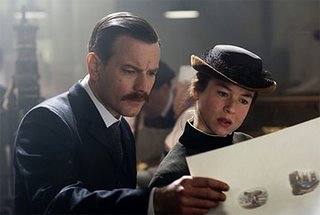Miss Potter

Miss Potter is a film that doesn’t quite work and yet somehow remains charming and even moving regardless.
Beatrix Potter (Renee Zellweger) is something of an aberration in 1902 London. 32 years-of-age and single, she is a virtual outcast, preferring the company of her own drawings to that of suitable, if silly, young men of the proper rank and station. This does not bother her. Quite the contrary. Something of a Victorian feminist, she is perfectly content with her lot in life, a sort of glorified housekeeper to her father and mother so long as she can continue to paint and write.
One day she decides to shop around her work to various London publishers. Her children’s books, filled with talking bunnies and ducks, do not go over well until she meets a pair of bothers, Harold and Fruing Warne (Anton Lesser and David Bamber). Secretly keen on giving their younger sibling Norman (Ewan McGregor) something to do in order to keep him out of their way, they accept to print her book, “The Tale of Peter Rabbit.”
But no one expected Norman to take Beatrix’s work as seriously as she did, nor did anyone imagine how enthusiastically children would snatch up her books. Almost overnight, Beatrix Potter finds herself very famous, very rich, and very much in love with Norman. Disapproving of her artistic endeavors, Beatrix’s strait-laced, upper-crust parents certainly do not appreciate her relationship with a man so below their social station. While Beatrix’s father understands her more than he is often willing to let on, it is to her mother that Beatrix is a mystery and a deep disappointment.
This would have been and perhaps should have been enough for a wonderful film. However, the filmmakers decided to branch out beyond this chapter of Beatrix’s life, encompassing many of the years that followed. The latter half of Miss Potter covers a shattering tragedy in Beatrix’s life and the burgeoning environmentalist’s efforts to secure land in England’s Lake District in order to keep it out of the hands of greedy developers. What does this have to do with the Peter Rabbit? Not much. The problem with this latter bit is that it feels tacked on, the over-reaching efforts of a screenwriter who simply couldn’t exclude any gem about his character’s life. While exhaustively researched, the film punches all the historical highpoints at the expense of any driving excitement.
Miss Potter took decades to get made. Much as Beatrix Potter herself had a devil of a time getting her “bunny book” published, it couldn’t have been much easier pitching a “bunny movie.” And then came Finding Neverland, the luminous tale about J.M. Barry and the inspiration for “Peter Pan.” A film of whimsy and delightful flights of fancy, Miss Potter attempts to ride the coattails of Neverland’s esthetics. And it works, albeit only intermittently.
And that is perhaps the oddest part of all. Director Chris Noonan (helmer of the overwhelmingly charming Babe) chose Miss Potter to break his 11-year sabbatical from filmmaking. So it comes as something of a surprise that, after making the most endearing film ever made about talking animals, Potter’s drawings that come to life aren’t featured more prominently and given more room to run. There was a lavishly charming film in there, just waiting to break out, but it is never given the chance.
It must also be said that Renee Zellweger is miscast as Potter. Not woefully, scandalously miscast; she simply struggles to make Beatrix credible. While her cherubic features take us half the way, her visible efforts to “play British” shatter the illusion and we never really buy into her in the role. Instead of Zellweger, it’s her co-stars who really impress. McGregor is smooth and charming. But it is Emily Watson as Norman’s sister, Millie, who steals the show as a feminist firecracker Jane Austin would have envied.
And so it is, perhaps, amazing that in spite of all these shortcomings and missteps, Miss Potter still succeeds. While it cannot sustain the fairytale enchantment of something like Finding Neverland, Miss Potter is, nonetheless, a worthy and sweet, middle-of-the-road biopic.
Beatrix Potter created a series of books and characters that are as beloved today as they were a hundred years ago when she first dreamed them into existence. While the filmic version of her life bites off more than it can satisfactorily chew, it provides just the sort of pleasant diversion for which the season calls.


0 Comments:
Post a Comment
<< Home